As a dog owner, you want to make sure that your furry friend is happy and healthy. You may be curious about what human foods are safe for dogs to eat, and one question that often comes up is whether or not dogs can eat banana peppers.

First, it’s important to know that not all human foods are safe for dogs. While some human foods can be beneficial for your dog’s health, others can be dangerous or even deadly.
This common misconception has led many pet owners to give their dogs table scraps without realizing the potential risks. Banana peppers are a type of pepper that is commonly used in cooking and often found in salads, sandwiches, and pizzas.
They’re a popular ingredient due to their mild flavor and bright yellow color. If you’re a fan of banana peppers, you may be wondering if it’s okay to share them with your furry friend.
Can Dogs Eat Banana Peppers?
The answer is yes – but with some caveats. While banana peppers themselves aren’t toxic to dogs, they can still cause some gastrointestinal upset if consumed in large quantities or improperly prepared. If you decide to feed your dog banana peppers as an occasional treat or supplement to their diet, it’s important to do so in moderation and under the guidance of your veterinarian.
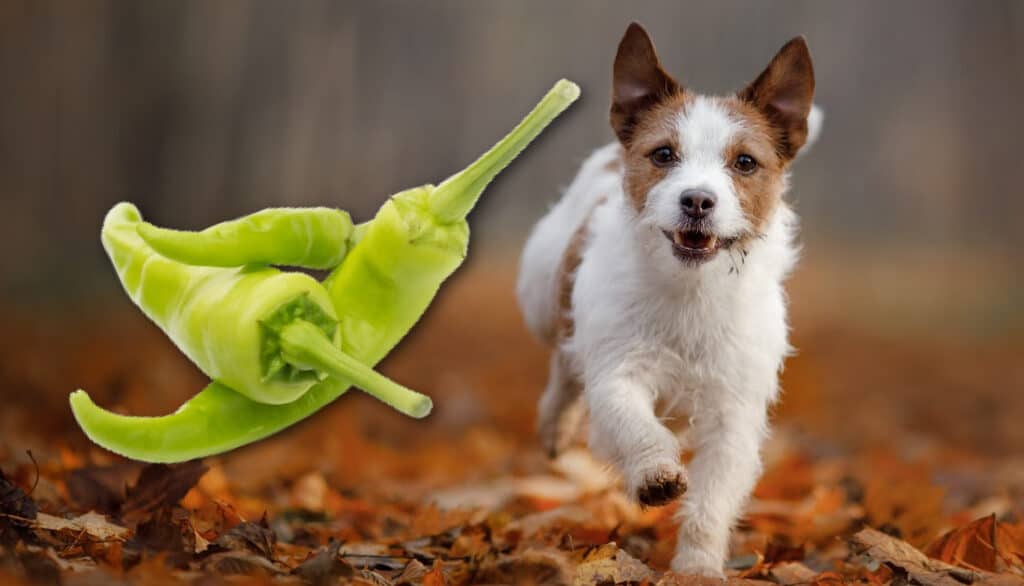
Potential Health Benefits
Banana peppers are low in calories and high in vitamin C. This makes them a healthy addition to any diet – including your dog’s! Vitamin C has been shown to boost immune function and improve skin health in both humans and animals. Banana peppers also contain capsaicin which has anti-inflammatory properties. It is known for reducing joint pain caused by arthritis which could benefit older pups
The Risks of Feeding Banana Peppers to Dogs
While banana peppers may offer some health benefits, it’s important to be aware of the potential risks as well. Feeding your dog too many banana peppers or not properly preparing them can lead to gastrointestinal upset. This can include diarrhea and vomiting.
Dogs that have never been exposed to spicy foods before may be more sensitive than others. If you’re introducing banana peppers into your dog’s diet for the first time, it’s crucial to start with a small amount and monitor their reaction closely.
While banana peppers can offer some potential health benefits for your dog, it’s important to do so in moderation and under the guidance of your veterinarian. Always consult with a professional before making any major changes or additions to your dog’s diet.
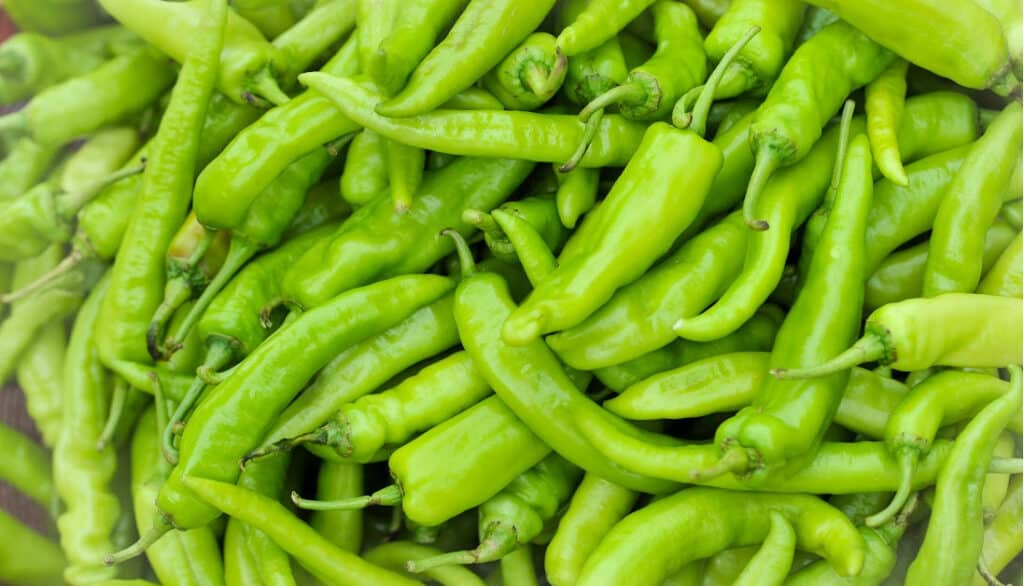
What are banana peppers?
Banana peppers are a type of chili pepper that is characterized by its long, curved shape and mild, sweet flavor. They are often used in various cuisines as a garnish, topping, or ingredient to add a tangy taste and vibrant color to different dishes.
These peppers usually range in color from pale yellow to bright green when unripe and deepen to bright red or orange when fully matured. You can commonly find them fresh in supermarkets or pickled on the shelves of your local grocery store.
A brief history
Banana peppers have been cultivated for centuries and have their roots in South America. They were eventually brought over by Spanish explorers who discovered these tasty peppers during their travels. Today, banana peppers are widely popular all over the world due to their unique flavor profile and versatility in cooking.
Nutritional value
Banana peppers are an excellent source of vitamins A, C, B6, and K1. These vitamins contribute significantly to maintaining good eyesight, strong bones, healthy skin, proper brain function and supporting the immune system.
Additionally, they contain folate (a type of vitamin B), which helps prevent birth defects during pregnancy. Banana peppers also provide fiber which can help reduce constipation.
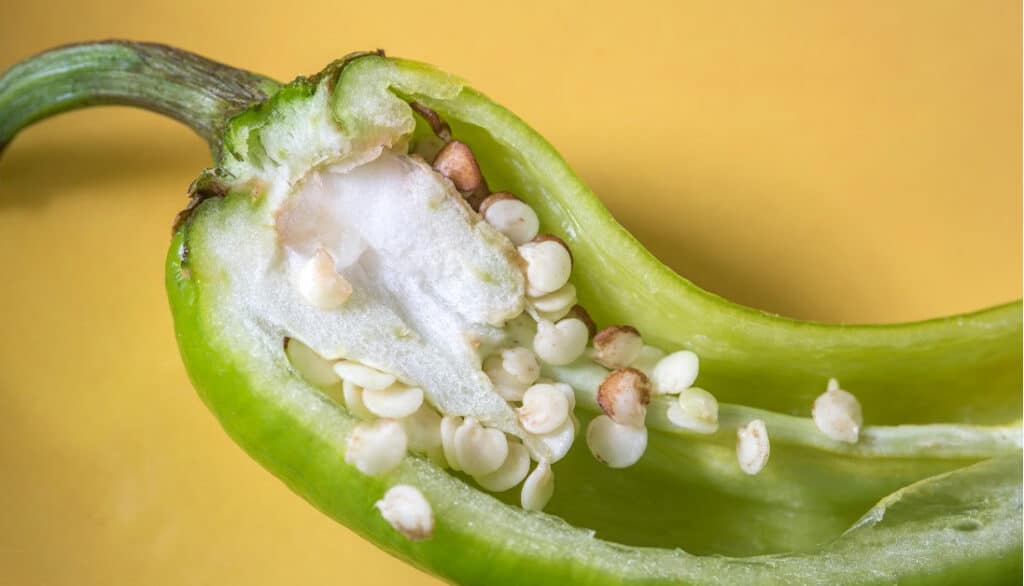
Health benefits for humans
Apart from being nutrient-dense fruits with an excellent taste profile that works wonders for most meal options; they have numerous health benefits associated with their consumption. One of the significant benefits is that they contain capsaicin (a compound that gives chili pepper its spicy flavor). This has been known to have anti-inflammatory properties that help alleviate pain associated with arthritis or other inflammatory conditions.
Furthermore, capsaicin has been linked with reducing blood pressure levels as well as lowering cholesterol levels. However, eating too much spice may result in acid reflux and heartburn in some people.
It is essential to be careful with the quantity consumed if you are unsure of its effect on your digestive system. Banana peppers offer an alternative source of Vitamin C. This can help build a healthy immune system. They have antioxidant properties that may help prevent certain types of cancer.
They also contain beta-carotene, which is a type of vitamin A that helps maintain good eyesight. Banana peppers are one of the most versatile ingredients in your kitchen.
Apart from being aesthetically pleasing to the eyes, they are flavorful and nutritious for humans. Despite their mild flavor profile, banana peppers have many health benefits associated with them that outshine their initial appearance.

Can Dogs Eat Banana Peppers?
Banana peppers are a type of pepper that is often used in various dishes for their mild, sweet flavor. While they can be a tasty addition to your own meals, you might wonder whether or not it is safe to share them with your furry friend. So, can dogs eat banana peppers?
Is it Safe for Dogs to Eat Banana Peppers?
The good news is that banana peppers are not toxic to dogs. They are generally safe for them to eat in moderation. However, as with any new food you introduce into their diet, it’s important to do so gradually and observe any reactions they may have.
It’s also important to note that some dogs may have an allergy or sensitivity to peppers, including banana peppers. If your dog shows any signs of an adverse reaction such as vomiting or diarrhea after eating banana peppers, stop giving them this food immediately and consult with your veterinarian.

Potential Risks and Benefits
While banana peppers are generally safe for dogs in moderation, there are both potential risks and benefits to consider before incorporating this food into their diet. One potential risk is that the spiciness of the pepper may cause digestive upset in some dogs.
Additionally, if the pepper is too spicy or too much is consumed at once it could lead to vomiting or diarrhea. On the other hand, there are also potential benefits of feeding your dog small amounts of banana peppers.
They contain vitamins A and C which can help support immune function and promote healthy skin and coat. It’s important to remember that while certain foods may offer health benefits for humans they may not necessarily be beneficial for our canine companions. Their bodies process nutrients differently than ours.
How Much Banana Pepper Can My Dog Have?
When introducing any new food into your dog’s diet it’s always best practice to start small and monitor their reaction. Begin by offering a small slice of banana pepper and observe for any adverse reactions such as vomiting, diarrhea, or stomach discomfort. If your dog shows no signs of a negative reaction, you can gradually increase the amount of banana pepper they consume over time.
However, it’s important to keep in mind that moderation is key and too much banana pepper can cause digestive upset. As a general rule of thumb, dogs should not consume more than 10% of their daily caloric intake from treats or human food.
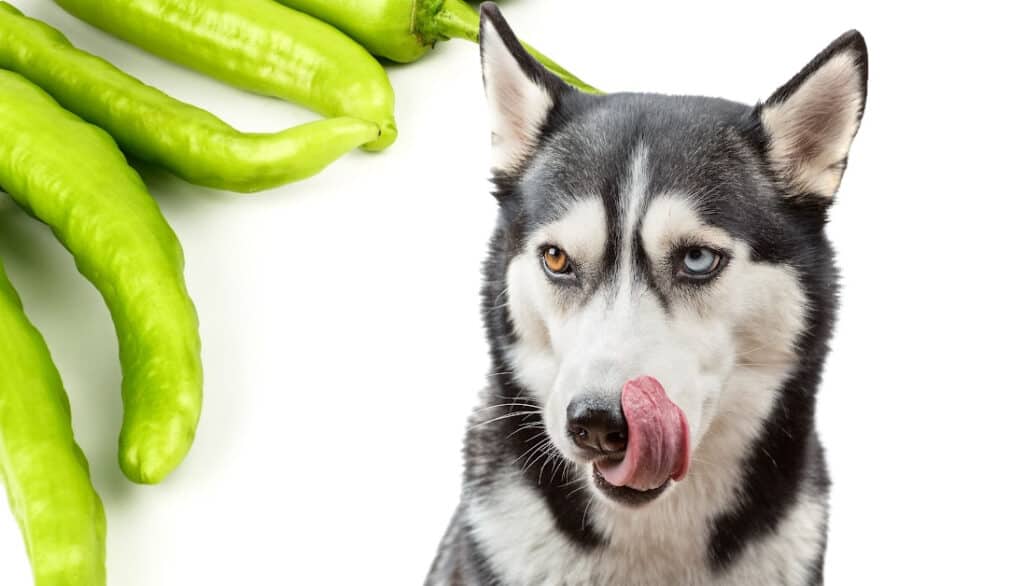
Preparing Banana Peppers for Your Dog
When preparing banana peppers for your dog it’s important to remove the stem and seeds as these can be difficult for them to digest. You should also slice the pepper into small pieces so that it’s easier for them to chew and swallow. Avoid feeding your dog pickled or canned banana peppers since these often contain added salt which can be harmful to dogs in large amounts.
The Benefits of Feeding Your Dog Banana Peppers
If you’re looking to add new flavors and textures to your dog’s diet, look no further than banana peppers. These sweet and spicy veggies offer a range of health benefits for both humans and dogs alike. Here are some of the reasons you may want to consider feeding your furry friend these tasty peppers:
- Rich in Vitamins – Banana peppers are a great source of vitamins C and B6. This can help boost your dog’s immune system, support healthy brain function, and aid in the production of red blood cells. Vitamin C is also an antioxidant that may help reduce inflammation in your dog’s body.
- High in Fiber – Fiber plays an important role in your dog’s digestive health, helping to promote regular bowel movements and prevent constipation. Banana peppers are a good source of both soluble and insoluble fiber, making them a great addition to any canine diet.
- Low in Calories – If you’re looking for low-calorie treats for your pup, banana peppers are an excellent option. A single pepper contains only around 10-20 calories, making it a guilt-free snack that won’t contribute to weight gain or obesity.
- May Aid Digestion – Banana peppers contain capsaicin, a compound that gives them their signature spiciness. Capsaicin has been shown to stimulate the production of saliva and stomach acid, which can help improve digestion.
- Can Contribute to Variety in Diet – Dogs can quickly get bored with the same old food every day. By incorporating new flavors into their diet such as banana peppers can add variety which will make mealtime more enjoyable for them.
Banana peppers are healthy not just for humans but for dogs as well. They offer a range of vitamins and minerals, fiber, and other nutrients that can contribute to a balanced diet for your canine companion.

Risks of feeding your dog banana peppers
While banana peppers have many health benefits for humans, they can pose some risks to dogs. It is important to know these potential risks before feeding them to your furry friend.
Too many banana peppers can cause gastrointestinal issues
Dogs have a different digestive system than humans, and too much of any new food can cause upset stomachs, diarrhea, or vomiting. Banana peppers are no exception. Feeding your dog an excessive amount of banana peppers can lead to gastrointestinal issues that could require a visit to the veterinarian.
Improperly prepared banana peppers can be dangerous
Banana peppers are often pickled in vinegar, which makes them acidic. Giving your dog large amounts of acid-rich foods like pickled vegetables can put them at risk for metabolic acidosis, which occurs when the body produces too much acid or has trouble removing it. Additionally, if the banana peppers were prepared with garlic or onions – both toxic foods for dogs – it could lead to severe health complications like anemia.
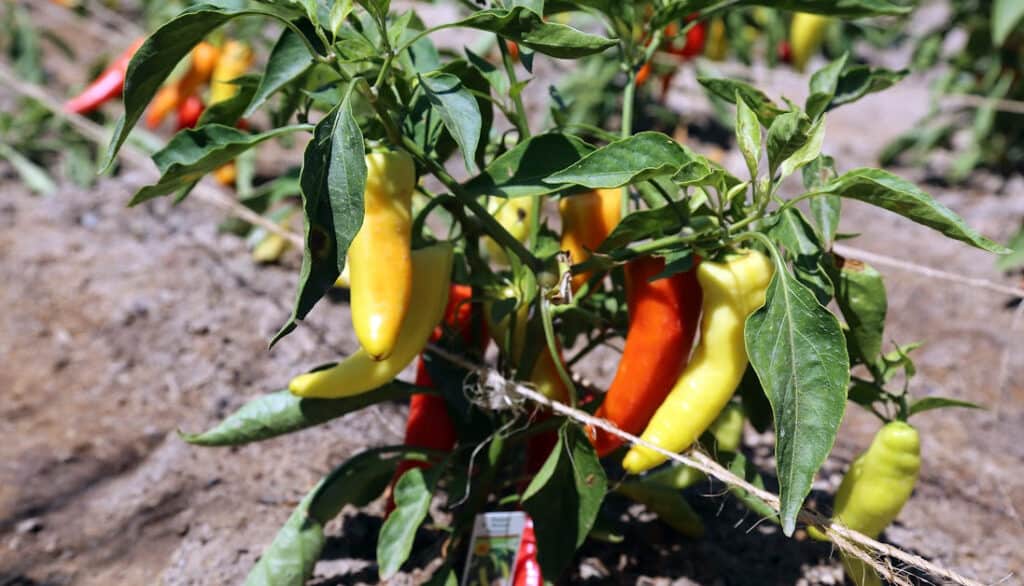
Not all dogs will react well to spicy foods
Some dogs may enjoy spicier foods without any issue while others experience negative reactions like vomiting or diarrhea. If you’re unsure how your dog will react to spicy foods like banana peppers, start with a small amount and monitor their behavior and bathroom habits closely.
How to safely incorporate banana peppers into their diet?
If you’re planning on introducing bananas into your dog’s diet there are a few things you need to keep in mind:
- Start with small amounts: Begin by adding just one or two thin slices of raw pepper and gradually increase as they become accustomed.
- Remove seeds and stems: Remove all seeds and stems from the pepper as this may cause digestive problems.
- Avoid seasoning: Do not add any salt, garlic, or other seasonings that could be harmful to your furry friend.
- Cooked vs. raw: Some dogs may prefer cooked banana peppers as they are easier to digest than raw ones.
- Consult with a veterinarian: Always consult with a veterinarian before introducing any new food into your dog’s diet.
While banana peppers are not toxic to dogs, it is important to be aware of the potential risks before sharing them with your furry friend. By following the guidelines outlined above and consulting with a veterinarian, you can safely incorporate banana peppers into your dog’s diet and enjoy their many health benefits together.

How to Feed Your Dog Banana Peppers
Preparing and Serving Banana Peppers Safely
Before feeding your dog banana peppers, it’s crucial to prepare and serve them properly. Start by washing the pepper thoroughly to remove any residual pesticides or dirt. You can use a mild vegetable wash or simply rinse with water.
Next, remove the stem and seeds from the pepper. The seeds can be particularly challenging for dogs to digest, so it’s best to remove them before serving.
You can also chop the pepper into small pieces, making it easier for your dog to chew and digest. When serving banana peppers, ensure you offer them in moderation as an occasional treat only.
As with any new food, introduce them gradually to avoid any digestive upset or allergic reactions. Monitor your dog after feeding him banana peppers for any adverse reaction.
Creative Ways to Incorporate Banana Peppers into Meals or Treats:
- Add chopped banana peppers as a topping on your dog’s regular meal.
- Mix finely diced banana peppers into homemade dog biscuits.
- Use pureed banana peppers as a base for frozen treats on hot days.
- Mix sliced banana peppers with other vegetables like carrots and green beans for a nutrient-dense snack.
- Use dehydrated banana peppers as a crunchy snack that will keep their teeth clean.
Remember that it is always essential to include variety in your dog’s diet so they can get all of their necessary vitamins and minerals from different foods.
Moderation is key when introducing new foods like Banana Peppers. Feeding your furry friend nutritious snacks like banana peppers can be an excellent way of providing variety in their diet while promoting health benefits such as Vitamin C intake along with helping digestion.
Preparing and incorporating bananas safely is key – starting slow by introducing them sparsely and monitoring any adverse reactions. Furthermore, getting creative with how you present this tasty vegetable can also provide a fun activity to bond and connect with your pet.

Conclusion
After considering the potential risks and benefits of feeding your dog banana peppers, it’s clear that moderation is key. While banana peppers can provide some health benefits to your furry friend, it’s important to remember that they are not a necessary part of their diet.
First and foremost, always make sure the peppers are thoroughly washed and free from any pesticides or harmful chemicals. It’s also important to remove the stems and seeds before feeding them to your pet.
If you’re looking to add some variety to your dog’s meals or treats, there are many creative ways you can incorporate banana peppers into their diet. Consider adding them as a topping on some homemade dog-friendly pizza or mixing them in with some mashed sweet potatoes.
When it comes down to it, all human foods should be approached with caution when considering feeding them to our furry friends. While certain foods may be safe for us humans in moderation, they may not be safe for our pets due to differences in digestion and metabolism.
While dogs can technically eat banana peppers in small amounts without experiencing harm, they should never replace the essential nutrients found in a high-quality commercial pet food diet. Always prioritize consulting with a qualified veterinarian before introducing any new foods into your pet’s routine – after all – we want only the best for our furry family members!
~Lindsie
